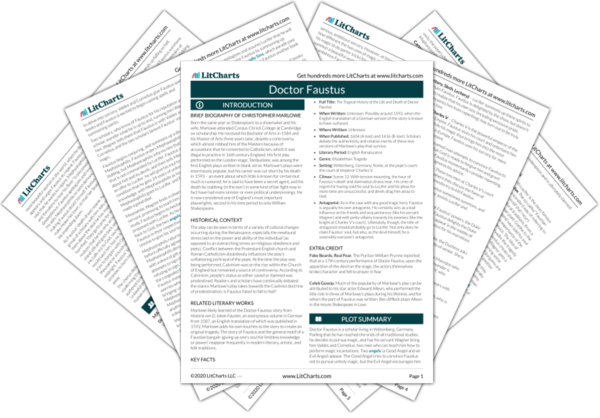Marlowe lived and wrote during the English Renaissance, and his play has much to say about the transition from a more medieval society to the Renaissance. Greatly simplified, this means a shift in a variety of ways from reliance on some kind of authority figure to reliance on one's own individual self. Humanist scholars of the Renaissance refocused their studies on the individual human subject, while the Protestant reformation affirmed the individual's prerogative to interpret scripture instead of relying on the pope and the hierarchical Catholic church. A flourishing of education and other social changes made it more and more possible for people to rise up through society through their own hard work and ambition.
Faustus embodies many of these changes: he is a self-made man, from humble origins, who has risen through education. He is ambitious and constantly desires to learn and know more about the world through various forms of scholarly inquiry. But Faustus also demonstrates some possible dangers in the Renaissance stress on one's own individual self. His self-reliance shades into selfishness and excessive pride. After making his deal with Lucifer, Faustus is too proud to admit that he was wrong and repent. He rejects the authority (and the help) of God and tries to handle things himself. While some resistance to authority and celebration of the individual may be a good thing (the play has no problems poking fun at the pope and the Catholic church, for example), Marlowe demonstrates the pitfalls of excessive individualism. Not only does Faustus serve as an example of excessive individualism. So does Lucifer himself, who originally rebelled against the authority of God. The tension between the Renaissance notion of the power and importance of the individual and the Christian stress on obeying God fills and animates Doctor Faustus. Although Faustus suffers for erring too far in the direction of the individual, Marlowe's tragedy leaves the question of how to balance these opposing values unresolved (some may, after all, sympathize with the fiercely ambitious Faustus), forcing readers to come to their own answers.
The Renaissance Individual ThemeTracker

The Renaissance Individual Quotes in Doctor Faustus
How am I glutted with conceit of this!
Shall I make spirits fetch me what I please,
Resolve me of all ambiguities,
Perform what desperate enterprise I will?
I'll have them fly to India for gold,
Ransack the ocean for orient pearl,
And search all corners of the new-found world
For pleasant fruits and princely delicates. (78-85)














